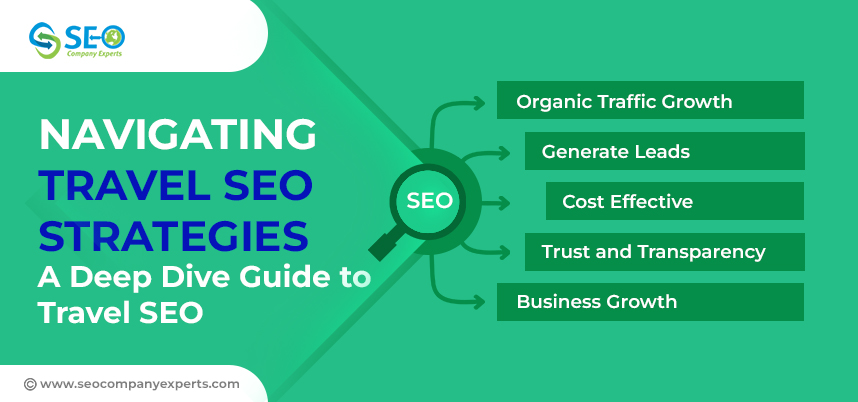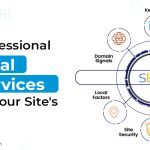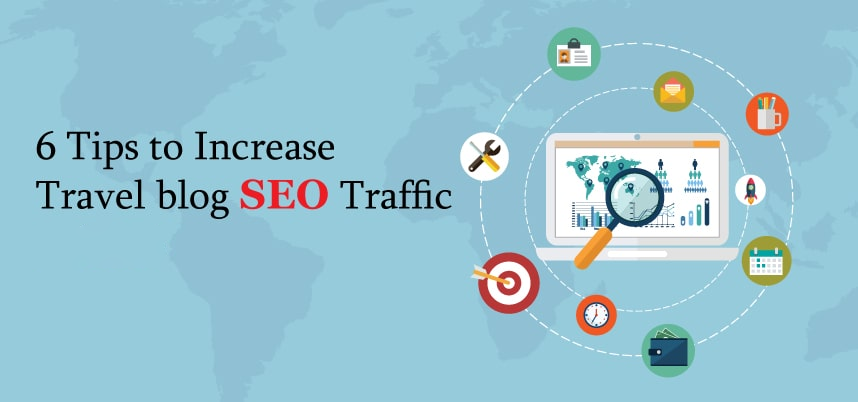

In the competitive online travel industry, high search engine rankings are crucial for driving website traffic and bookings. Implementing effective search engine optimization (SEO) strategies can significantly improve your site’s visibility and help attract your target audience. Boosting your search rankings takes work, but the payoff can be huge in terms of driving qualified traffic to your site.
In travel SEO services, search visibility is about making it easy for people to find your website organically when they search for relevant keywords related to your offerings. Whether it’s a specific destination, type of vacation, or travel service, you want your site to show up on the first page of Google.
In this post, we’ll explore some key tactics on SEO services for the travel industry for optimizing a travel website for better search performance.
Importance of SEO for Travel Businesses
A travel company’s website is often the first touchpoint for potential customers. With so many travel booking options online, standing out in search engine results is more important than ever. That’s where travel SEO services come in:
1. Organic Traffic Growth
One of the biggest benefits of SEO services for the travel industry is the ability to continuously grow organic website traffic over time. Unlike paid ads, which can be turned off, organic rankings allow you to build a more stable, long-term stream of visitors.
The higher your pages rank for high-volume searches, the greater the potential growth in organic traffic. For example, if you can crack the first page for “Hawaii vacations” and “cheap flights to London,” the monthly visitors for those competitive terms could be huge.
2. Generate Leads
One of the valuable aspects of SEO for travel companies is the ability to generate high-quality leads. SEO provides a steady flow of interested customers by bringing in visitors who are actively searching for the types of trips and services offered by the website.
Travel SEO services open up lead-generation opportunities from interested searchers that simply can’t be matched through other channels. More quality leads mean more chances to promote your ideal offers and turn them into bookings.
Unlock More SEO Traffic Into Your Website Get a Free Consultation!
3. Cost Effective
Once your pages are optimized and ranking well for key terms, search engine traffic is essentially “free” aside from the initial time invested. There are no ongoing costs per click like with pay-per-click ads.
This allows small travel businesses to compete with larger brands based on the quality of their website and content alone, rather than the size of their advertising budgets. Good SEO services for the travel industry– levels the playing field.
4. Trust and Transparency
By showing up prominently in organic search results, it signals that your website is authoritative, reputable, and trusted by search engines.
Unlike paid ads, which can feel intrusive, people expect and value organic results based on true relevance.
By being discovered organically, travel sites can demonstrate they have nothing to hide. For sites with useful content, SEO helps establish credibility and foster consumer confidence in your brand as a trusted destination source.
5. Business Growth
By bringing in a steady stream of qualified website traffic, SEO can expand your reach and customer base over time.
As you improve keyword rankings and organic traffic climbs, the travel SEO agency compounds growth in brand awareness and bookings. More traffic equals more chances to convert visitors into customers. Higher conversions lead to more revenue.
See also 6 Tips To Increase Travel Blog SEO Traffic
How to Optimize Travel Website for Search Engines
Having an effective SEO audit service and strategy is crucial for travel brands looking to drive more website traffic and bookings from search engines like Google. By optimizing your site for relevant keyword targets, you can improve your search visibility and attract more visitors during the trip planning stages. Below are a few of the ways through which you can navigate your SEO strategies:
1. Website Optimization
The technical foundation of any travel website is key for search engine optimization. Before diving into content and keywords, be sure your site’s technical SEO factors are optimized. The optimization includes fast page load speeds by minimizing large file sizes for images, videos, etc. Quick load times improve visitor experience and search rankings.
Another factor to look into while optimizing a website is to check the site’s mobile-friendly and responsive factor across devices like smartphones and tablets. Mobile optimization is a strong ranking factor. Implementation of SSL encryption for security and having a sitemap XML file aids search engine crawling.
Below are listed a few important factors to look into while optimizing websites:
1.1. Website Audit
A website audit is a crucial first step when optimizing any travel site for search engines. This involves thoroughly evaluating both on-page and technical factors to identify any issues hindering performance. Addressing any technical problems or on-page issues identified in your audit will help establish a solid SEO foundation before moving into content and links. Regular audits allow you to catch any new problems early.
1.2. Google Business Profile
Creating and optimizing a Google Business Profile is an excellent way for travel companies to improve local search visibility. This gives you an opportunity to stand out in Google Maps and search for critical keywords containing location names. An optimized Google Business Profile establishes your brand as a legitimate local business in the eyes of search engines and customers alike. This is especially valuable for travel companies that depend on location-based demand.
1.3. Mobile Responsive
With Google’s mobile-first indexing now in effect, the mobile version of your site can directly impact search rankings and visibility. Ensuring your travel website is fully responsive and mobile-friendly is critical for both user experience and SEO success. Users expect a fast, seamless experience on smartphones and tablets.
2. Keyword Research
Thorough keyword research provides the foundation for an effective travel SEO agency strategy. Identifying and prioritizing the right keyword targets will directly inform content creation and optimization to drive rankings and traffic. For example, you can use Google’s autocomplete and suggested discovery searches based on user intent. Look for travel-related phrases.
Ongoing travel keyword research provides the insights needed to align site content with high-value search opportunities. This enables more targeted optimization and visibility gains.
2.1. Long-tail Keywords
Long-tail keywords are more conversational, natural phrases with 3 or more words, such as “flights to Costa Rica” or “family all-inclusive resorts in Mexico.” While lower volume, these terms have high commercial intent and conversion potential. Optimizing for long-tail search terms can help travel sites target less competitive keywords with qualified traffic potential based on specifics.
2.2. Short tail Keywords
Short tail keywords are generic broader terms that searchers commonly use upfront in travel planning stages, such as flights, hotels, vacations, and travel packages. Ranking well for popular short-tail searches can direct large volumes of relevant traffic to your site early in trip planning. This high-potential visibility is worth the effort.
2.3. Competitor Analysis
Analysing competitors’ SEO strategies and keyword rankings provides valuable intel to help inform your own optimization approach. Regular competitor SEO analysis gives you an accurate picture of the keyword landscape to strategically expand your own visibility and traffic.
2.4. Keyword Mapping
Keyword mapping involves categorizing your target keywords to align with relevant pages and content across your website. This enables more targeted optimization. Strategic keyword mapping increases relevance signals to search engines and allows you to optimize pages for semantically related terms. This drives more targeted traffic.
3. Content Marketing
Creating fresh, high-quality content constantly is hugely beneficial for improving a travel brand’s search rankings and driving organic traffic. Producing optimized blog content around travel trends and industry analysis builds subject authority. Regular, SEO-optimized content that provides value for travellers demonstrates expertise in destinations and builds trust for converting bookings.
3.1. Develop Content Strategy
A strong content strategy is key to effective content marketing. When developing your strategy, start by getting clear on your target audience. For example, understand who your audience is and what they care about. Spend time researching their pain points, interests, and preferences.
3.2. Create Quality Content
The core of any successful content marketing effort is high-quality content. Forget fancy formats – focus first on value and relevance. Start by asking – what questions and concerns does my audience have? How can I help solve these issues with my content? Research thoroughly to create content that provides real insight. Write conversationally, in simple language your customers use. Craft compelling headlines that communicate what the reader will gain. Structure content so key takeaways stand out.
3.3. Social Media Branding
Social platforms present a major opportunity to share your branded content to drive awareness and engagement. But simply blasting content won’t cut it. The key is cultivating communities through valuable participation. With authentic, consistent participation and valuable content sharing that engages communities, social platforms allow brands to connect with audiences in a personal way at scale. The relationships and trust built can drive real business impact.
4. Off-page Optimization
Driving qualified traffic to your site goes beyond content and SEO efforts. You need a sound off-page SEO strategy to improve discoverability and rankings.
Start by ensuring your site is indexed properly so content can be crawled and ranked. Creating XML sitemaps helps search bots discover new pages. Then, focus on quality link-building from relevant sites. Guest post on reputable blogs in your niche, sponsor travel shows, or reach out to known regional influencers to earn backlinks.
4.1. Backlink Improvement
Earning quality backlinks remains one of the most important ranking factors. But all links are not made equal – their value depends greatly on the site they come from. As you build links, prioritize relevance, authority, and transparency.
4.2. Local Listing
For travel websites, local search visibility is critical to reaching nearby customers searching for specific destinations or activities. Optimizing local listings enhances discoverability and trust signals. Monitoring local search rankings and nurturing listing profiles with useful content builds awareness among prospective visitors planning trips to your destination. Maintaining accurately updated profiles across key sites keeps your business findable.
4.3. Guest Posting
Placing posts on popular travel blogs offers a rewarding way to earn quality backlinks and raise awareness among highly-targeted audiences. But getting your pitch accepted by reputable sites calls for insight and effort. With strategic guest posting campaigns focused on delivering real value to reputable niche sites, travel brands can net website referrals and recognition from perfectly targeted travel enthusiasts.
5. On-page Optimization
While quality links matter, search engines still base rankings predominantly on assessing on-page elements when crawling sites. To achieve higher surface results, travel sites must master key optimization areas. With technical SEO foundations coupled with on-page optimization best practices applied at scale, travel SEO services sites can substantially improve findability and conversions from search over time.
5.1. Schema Mark up
Implementing schema mark up enables search engines to better interpret and represent your pages in results. For travel sites, the usage of hotels, tours, articles, and other travel-related schema can be very impactful.
5.2. Internal Linking
Implementing schema mark up enables search engines to better interpret and represent your pages in results. For travel sites, the usage of hotels, tours, articles, and other travel-related schema can be very impactful.
5.3. Meta Tag Optimization
Properly optimized meta tags help reinforce page relevancy signals to search engines. For travel sites, focus on crafting compelling page titles, descriptions, and social tags. Keep page titles succinct, ideally under 60 characters. Summarize the destination or key activity focus using prominent keywords early in the title. With interesting keyword-optimized met info for every page, travel sites can more effectively reach targeted visitors from search across multiple platforms.
Transform Your Online Presence With the Best Agency Get Free SEO Analysis!
Conclusion
The SEO services for the travel industry today are highly competitive and increasingly reliant on online discoverability. With over 90% of travellers using search engines to plan vacations, implementing SEO is no longer optional.
By optimizing technical foundations, improving website content, earning backlinks, managing local listings, and leveraging schema mark up, travel brands can drive more qualified traffic to their sites. Prioritizing channels travellers use to inspire and evaluate options is key.
The keys are understanding core SEO principles, identifying where your audience searches for information online, and building keyword-driven, mobile-friendly experiences finely tuned to their needs. With the right strategies and some perseverance, significant returns await.





